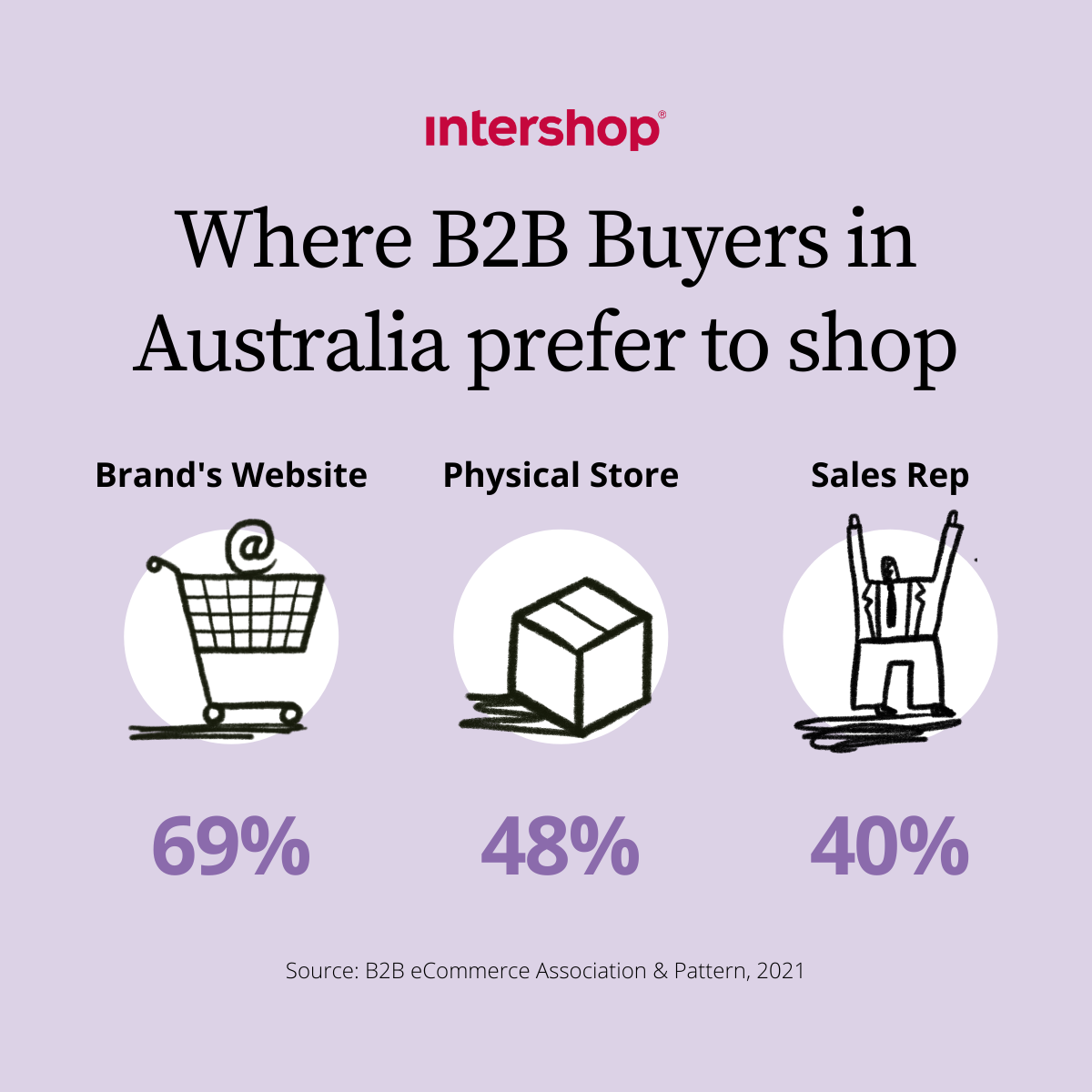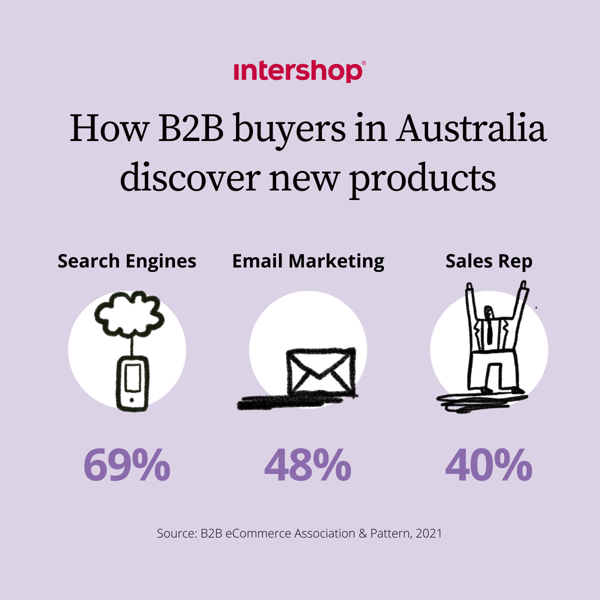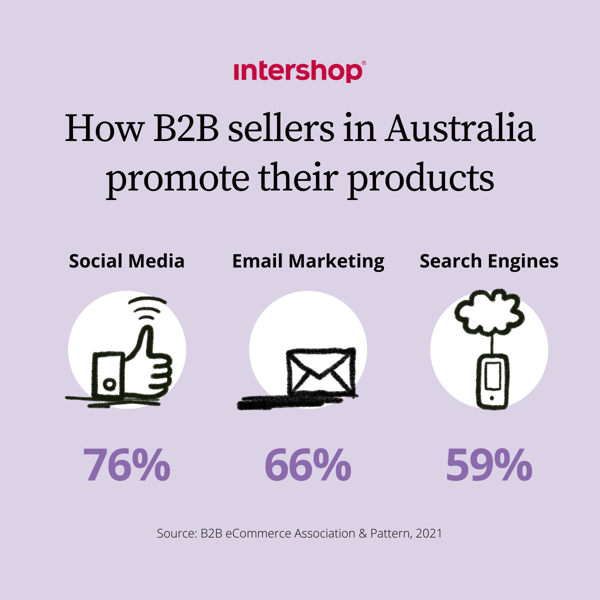Australia's e-commerce market is growing, and buying habits have changed.
The pandemic played a big role in reshaping buyers' and sellers' behaviour. It pushed people, buying for themselves or their business, to shop online. More sellers have gone digital too - to sustain their operations and meet their customers where they are.
In The State of B2B eCommerce in Australia - 2021 Annual Report, the B2B eCommerce Association (B2BEA) dive deep into the dramatic shift in:
- The change in B2B buyer behaviours
- How B2B brands response to the changes
- How B2B brands can thrive in the digital future of Australia
The study gathers insights from more than 400 Australian B2B buyers and sellers from a range of industries from information technology & electronics, health & medical, industrial & construction, and food & beverages.
Click to read the most important findings:
- How B2B buyers in Australia prefer to shop?
- How B2B buyers in Australia discover new products?
- Where should B2B brands in Australia promote their products?
- The key decision making criteria for B2B buyers in Australia
- The future of B2B e-commerce in Australia
 Where B2B buyers in Australia prefer to shop?
Where B2B buyers in Australia prefer to shop?

Although B2B trails B2C in terms of digital adoption, this may not hold true for long.
About 44% of respondents say that they will likely conduct half of their business purchases online in the next 12 months.
The majority opted to buy directly from brands' websites. Retail stores remained fairly popular, and some are still more comfortable with sales representatives.
Interestingly, e-commerce marketplaces were the least favourite of B2B buyers that were surveyed.

How B2B buyers in Australia discover new products?

For product discovery, buyers found new products for their business primarily through search engines, email marketing, sales representatives, and social media.
Printed catalogues or mailers received slightly more attention than e-commerce marketplaces. TV and radio were the least popular channels.
For sellers, these findings highlight the importance of being presence online, but also that an omnichannel presence - blending digital with brick-and-mortar - may give you the best results.
Many buyers still prefer to liaise with sales representatives. This means having a workforce who knows your product inside out is a value-add your company could offer.
Still, B2B marketplace product search will likely grow in Australia in the coming years. Possibly mirroring the trajectory of markets like the US, where product searches on Amazon have surpassed the search engines.
💡 Interested in the full research? Download the report.

How B2B sellers in Australia promote their products?

B2B brands did not give search engines as much attention as their buyers did. Social media and email marketing ranked above search engines for driving traffic to their websites.
"The majority of sellers (44%) report that their top sales-generating channel was their own websites."
The finding is consistent with buyers' strong preference for buying directly from brands. This was followed by retailer sites, marketplaces, and distributors. Third-party websites generated the least amount of sales in Australia.
Two key advantages to selling on your website are:
-
Control your brand's narrative
-
Own your customer's data and utilise the insights
This will allow you to tweak your strategy accordingly. Managing your own site and the various components of an online business may seem like a lot of work, but the return on investment (ROI) will be worthwhile in the long run.
💡 To learn more about the ROI for B2B e-commerce platforms, we covered the topic in this video and article.

The decision making criteria for B2B buyers in Australia
Both sellers and buyers agree that price, product availability, and product quality are among the top reasons affecting purchase decisions.
"Price is not (always) the deal breaker."
Many sellers think buyers want transparent pricing with the ability to find and purchase with ease, however service expertise and fast delivery rank higher in buyers' decision making criteria.
"If Australian B2B companies hope to survive and thrive, a digital strategy is an essential part of the organisation's core DNA.
For those that are just beginning their e-commerce journey, a clear vision and roadmap are equally as important as a willingness to be open and learn from new ideas."
Brett Sinclair,
Founder & Director, B2B eCommerce Association

The future of B2B e-commerce in Australia
Sellers will continue to digitalise
As buyers become even digital, sellers must keep pace.
In 2022, sellers say they will be focusing on the following areas of their digital operations:
- E-commerce technology
- Customer Relationship Management (CRM)
- Marketing automations
- Supply chain enhancements
- Product data
If you're looking to grow your B2B e-commerce business, investing in some of these tools can help you maintain your competitive edge.
Best part is you don't even have to do it all yourself.
The report found that a big chunk of B2B brands that are doing digital commerce well are those that are working with external strategist and have outsourced all or part of their operations. This hints at the benefits of partnering with e-commerce solutions experts that can provide end-to-end support.
Intershop offers localised enterprise e-commerce expertise for Australian and New Zealand companies.
We help create contextual, personalised customer experiences that help B2B brands boost loyalty and business growth. Talk to our experts to see if Intershop is a fit for your business.
Top technology trends for e-commerce in 2022
This year, digital technologies will open up plenty of opportunities for B2B e-commerce players in Australia.
According to the report, some of the most notable e-commerce trends we'll see in are:
|
Progressive Web Applications (PWA) PWA will give customers a seamless shopping experience whether they're on their phone, tablet, or laptop. The technology will save B2B brands the hassle of developing their own native apps. Operating systems (such as Apple for iOS) are adding more support in their ecosystem for PWA. |
|
Cloud-native microservices, PaaS, and SaaS Cloud infrastructure will allow for agile, scaleable, cost-effective technology solutions with that comes better PaaS and SaaS support. |
|
First-party data and individualisation As consumers demand better data privacy and the future of third-party cookies remains unclear, the industry will learn to rely on first-party, direct-from-customer data that only B2B brands can access. |
|
E-commerce platforms and third-party apps that integrate well out-of-the-box B2B e-commerce players will increasingly prefer platforms that allow them to bring multiple, disparate systems together to manage their business efficiently and offer a smooth customer experience. |
|
Digital commerce platforms that enable self-service Buyers how expecting fast, always-available service, having self-service capabilities will go a long way in keeping customer loyal and satisfied. |
 Wrapping this up
Wrapping this up
B2B buyer behaviours have change drastically and, likely, for good.
They are now open to buying from digital channels, especially from the brands' websites. Brands have to rethink the way they sell, moving from offline to building a virtual brand.
"However, building an omnichannel business remains the best option. Because B2B buyers still prefer to speak with a sales rep and occasionally visit a physical store."
Besides being discoverable through search engine optimisation and providing a smooth shopping experience online, B2B sellers have to prove their expertise and ability to deliver quickly.
Investing in digital technology is a wise way to take your B2B e-commerce business forward.
 Ready to explore digital commerce for your B2B brands?
Ready to explore digital commerce for your B2B brands?
Digitalising your e-commerce business is crucial to staying competitive. Building a roadmap now can help you maintain or grow your competitive edge.
And while these digital technologies have the potential to grow your business, not all of them will be suitable for your digital maturity or your audience. You will need to evaluate the return on investment.
Intershop offers localised enterprise e-commerce expertise for Australian and New Zealand companies. Talk to our experts to see if we're a fit for your business.






